I’m posting on this story for exactly one reason. I’m tired of reading the various permutations on it because each version is less honest than the one before it.
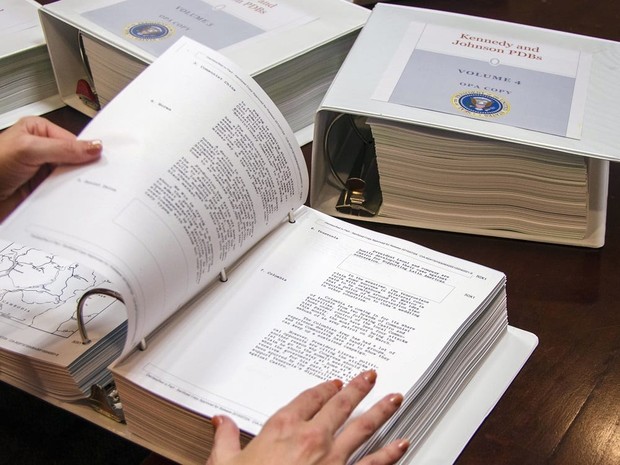
This image provided by the Central Intelligence Agency shows a binder that contains publicly released copies of the President’s Daily Brief’s during the late 1960s. After the political convention confetti is swept away, a more sobering tradition of the presidential election begins: The regular, top-secret intelligence briefings for the nominees. President Harry S. Truman started the briefings to get candidates up to speed before they take office. (CIA via AP)
This is the breaking news headline in the Washington Post: Breaking with tradition, Trump skips president’s written intelligence report and relies on oral briefings
For much of the past year, President Trump has declined to participate in a practice followed by the past seven of his predecessors: He rarely if ever reads the President’s Daily Brief, a document that lays out the most pressing information collected by U.S. intelligence agencies from hot spots around the world.
Trump has opted to rely on an oral briefing of select intelligence issues in the Oval Office rather than getting the full written document delivered to review separately each day, according to three people familiar with his briefings.
Reading the traditionally dense intelligence book is not Trump’s preferred “style of learning,” according to a person with knowledge of the situation.
The arrangement underscores Trump’s impatience with exhaustive classified documents that go to the commander in chief — material that he has said he prefers condensed as much as possible. But by not reading the daily briefing, the president could hamper his ability to respond to crises in the most effective manner, intelligence experts warned.
If this sounds familiar it is because it is. From Politico, a month before Trump was inaugurated: Trump: I don’t need daily briefings. (I posted on the utter Armageddon that was sure to cause.)
Then there was this spasm, also from the Washington Post: How President Trump consumes — or does not consume — top-secret intelligence.
President Trump consumes classified intelligence like he does most everything else in life: ravenously and impatiently, eager to ingest glinting nuggets but often indifferent to subtleties.
Most mornings, often at 10:30, sometimes earlier, Trump sits behind the historic Resolute desk and, with a fresh Diet Coke fizzing and papers piled high, receives top-secret updates on the world’s hot spots. The president interrupts his briefers with questions but also with random asides. He asks that the top brass of the intelligence community be present, and he demands brevity.
In a post on that article, I recapped how different presidents took their briefings.
Each president has had his own style of dealing with the PDB.
Jimmy Carter read it after listening to highlights and other information from his national security adviser, Zbigniew Brzezinski. Carter then sent notes on the PDB to Brzezinski.
Ronald Reagan let his national security advisers brief him on it, then asked questions; Bill Clinton read it ahead of time, but early in his career he canceled the briefing when he believed that the PDB taught him nothing new and that he had more important budgetary matters to handle. George H.W. Bush was briefed on it and, as a former CIA director, often stretched the meeting to discuss how information had been obtained. George W. Bush read the PDB as he was being briefed, asking questions along the way.
The George W. Bush administration included a threat matrix in each morning’s session. Now, counterterrorism issues, when necessary, are included in the PDB materials, and Obama meets weekly with FBI Director Robert S. Mueller III and others specifically on the terrorism threat.
Obama reads the PDB ahead of time and comes to the morning meeting with questions. Intelligence briefers are there to answer those questions, expand on a point or raise a new issue. Clapper may be present once or twice a week, but most often one of his deputies is in attendance in case an intelligence community issue arises.
In the process they recycle this total lie:
The document, while traditionally lengthy and dense, contains key insights that can create a cumulative body of knowledge — and foreshadow looming threats, intelligence professionals said.
President George W. Bush faced a political firestorm over how closely his administration was paying attention to the PDB after it was discovered that a month before the 9/11 attacks, his briefing book had included a warning that Osama bin Laden was “determined” to attack U.S. targets using airplanes.
Factually, that PDB did not make that claim. It warns about airplane hijackings and attacks with explosives. It doesn’t hint at using airplanes as missiles. Were such a plot discovered, hiding the clues in the PDB and hoping that the president picks up on it as some kind of a test doesn’t seem like the best way of running an intelligence operation.
Other than recycling the “Trump is stupid” meme, I can’t figure out the purpose of it. I can’t, for the life of me, understand why reading the PDB is better than being briefed on it and being able to answer questions. I don’t understand why it is insufficient to have experts on staff as opposed to a poseur like Obama pretending to be an all-around expert and f***ing up everything he touched. Do you really want a president making spot decisions based off what he thinks he recalled from reading a PDB some months ago? And mostly because this just doesn’t matter. It didn’t matter for Obama. It didn’t matter for Bush. It didn’t matter for Clinton. And it doesn’t matter for Trump. Because that is not how the national security system operates. And if you think Trump is so dumb he can’t comprehend the briefing, I don’t know why you’d think reading a document without pictures would be an improvement.
Maybe one day these bizarre little stories will cease…perhaps when there is a Democrat in the White House.
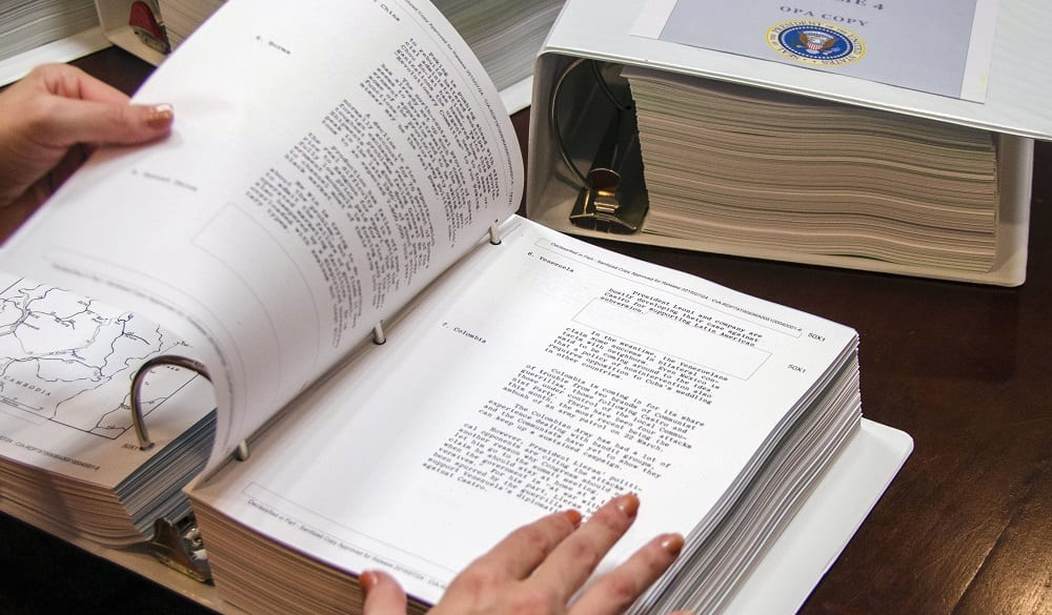

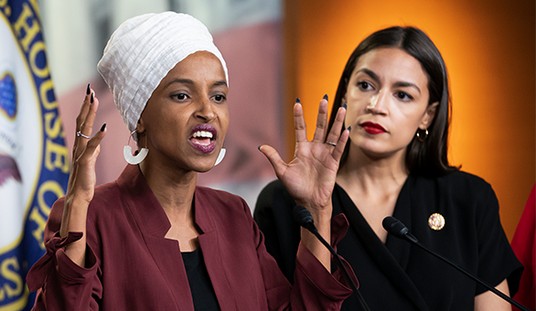



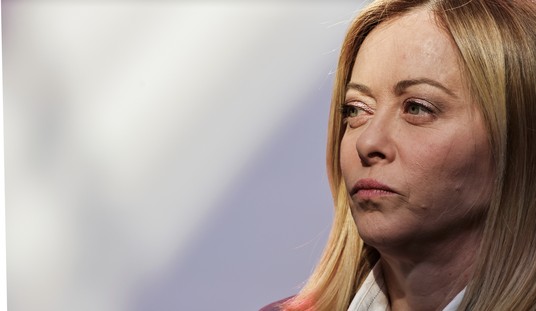

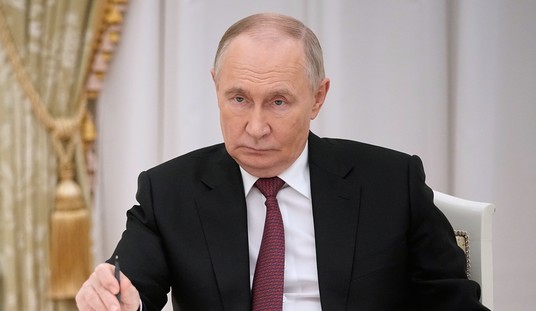

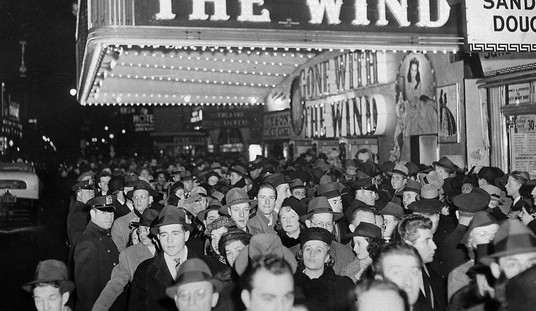

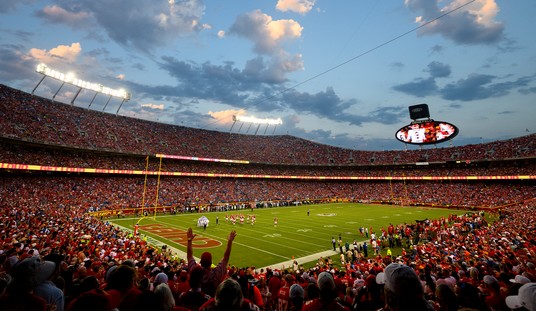
Join the conversation as a VIP Member